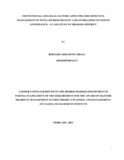INSTITUTIONAL AND LEGAL FACTORS AFFECTING THE EFFECTIVE MANAGEMENT OF WETLAND RESOURCES IN A DECENTRALIZED SYSTEM OF GOVERNANCE: A CASE STUDY OF MBARARA DISTRICT
Abstract
The study investigated the institutional and legal factors affecting effective management of wetland
resources in a decentralized system of governance in Uganda. It was conducted in Mbarara district
and the objectives were:- to establish the effect of institutional funding on effective wetland
management in a decentralized system of governance in Uganda; to examine the effect of institutional
human resource on effective wetland management in a decentralized system of governance in
Uganda; and to assess the effect of the existing laws on the effective management of wetlands in a
decentralized system of governance in Uganda.
In the study, both qualitative and quantitative methods of data collection and analysis were used based
on a case study design. Data was collected using questionnaires, interviews, FGDs and documentary
reviews and was subsequently analyzed using frequencies, percentages and correlation coefficient
with the help of SPSS, version 16. Qualitative data were analyzed by thematic and deductive
techniques.
It was found out that all variables had moderate relationship with effective management of wetland
resources with slight variations in strength. The above findings were as well backed by the
expressions of various stakeholders interfaced with during the study through FGDs and interviews.
There is therefore a need for efficient planning and budgeting mechanism at district levels with
wetland resources key on the priority list; recruitment the required personnel to handle day today
management of wetland resources both at the district and lower local government levels and a need
to streamline existing legal framework for wetland management with efforts put at formulating a
national wetland specific law and local governments wetland ordinances and byelaws that would go
a long way in enhancing sustainable management of wetlands resources in the country

